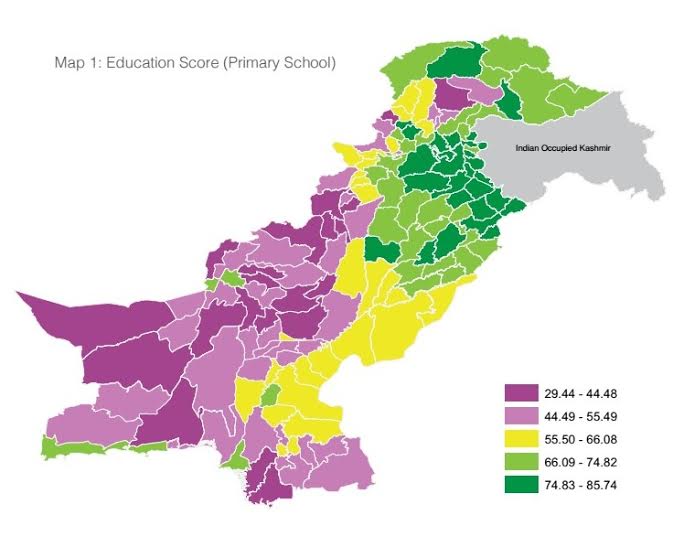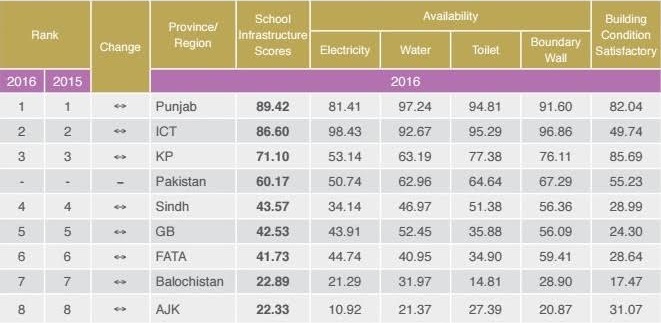Only 52% of government schools in the country have access to all four basic facilities which include toilets, boundary walls, electricity and drinking water, reveals the survey
ISLAMABAD – Pakistan District Education Rankings 2016 claims that Islamabad, Chakwal, and Kotli districts are on top of the list whereas Qila Abdullah, Dera Bugti, and Lakki Marwat at the bottom.
Report also revealed that only 52% of all government schools in the country have all four facilities, including toilets, boundary walls, running electricity and drinking water. It also shows that a staggering 81% of all government schools are primary schools. “This essentially implies that after primary education, children in Pakistan have very limited opportunities to continue their education” it says.
The report was jointly launched by Sustainable Development Policy Institute (SDPI) and Alif Ailaan in Islamabad. The report, which is the fourth annual iteration for tracking progress and performance of various regions of Pakistan aims to help understand the state of education in Pakistan and call attention to the evidence of a deep and persistent national crisis. This year, the report covers all 151 districts across the country to assess their education scores, based on levels of enrolment, retention, learning, gender parity and school facilities.
“The district rankings highlight the systematic inequalities among the districts and the regions in Pakistan. The state of education in the districts of South Punjab, Balochistan and FATA is worse than some of the sub-Saharan African countries, while the districts of North Punjab emulate developed countries like Canada” said Marc Andre Franche, Country Director UNDP. He stressed the need for constituency level data on education in order to empower voters to raise more concerted demands from their political representatives.
“If we continue with present rate of enrollment, it will take 60 more years to reach 100 per cent enrollment” warned Marc Andre, stressing the need for drastic change to achieve 100% enrollment in our lives.
“Balochistan is faced with three main challenges; first is ghost schools, teachers and students, second is lack of political will, and third is corruption” pointed out Jan Achakzai, former leader of JUI-F. Explaining the situation of Balochistan, Jan said there are at least 15,000 ghost teachers, who draw salary from the government treasury, 1000 ghost schools, and 3000 ghost students. Some teachers in Balochistan are part-time teachers and part-time politicians.
PTI MNA Dr Arif Alvi said many of Pakistan’s problems are related to education. “We need to focus on all the pillars of state, and education is one of them.” Quoting a study, he said, 20-30 % parents focus on infrastructure and rest on the quality of study. In a country liek Pakistan, it essential for politicians to take ownership of the schools and children in their respective constituencies at an individual level, he suggested.
Mian Iftikhar Hussain of ANP stated that, “quality of education is a moral obligation of the state. It is critical for the politicians to prioritize their agenda on education”. He stressed for hiring teacher solely upon merit to improve education system.
Speaking on the occasion, Minister of State for Federal Education Balighur Rehman said such rankings create a healthy competition that helps improve the state of education. “When I took charge of the ministry, we were confronted with the challenge of accessing correct and authentic data” he said emphasizing the importance of data. With the increases spending on education in 2016, the number of out of school children has dropped by two million in Pakistan, he said.
SDPI Executive Director Dr Abid Q. Suleri said the report is being launched at a time when federal and provincial budgets are in the offing and findings of this report would help policy makers during their debate on budget to build an argument on credible information. He said, te study would not only improve the quality of existing data but also establish the data on missing indicators.
Education ranking in different regions:
Islamabad – The Federal Capital is atop both the provincial/regional rankings, as well as the district rankings for the first time with increased learning and enrollment scores.
Punjab – Punjab remains consistent in both the education and school infrastructure rankings. The survey found that over 93 percent of schools in the province had all four facilities available, rendering their schools more complete than other provinces.
AJK – Azad Jammu and Kashmir (AJK) has consistently performed above the national average for the past four years in Education Score.
FATA – The Federally Administered Tribal Areas (FATA) and Balochistan round-up the bottom of the provincial rankings.
Gilgit-Baltistan – Districts from Gilgit-Baltistan (GB) continuously appear in the top half of the rankings. With 50 percent of its school facilities not available, GB, like AJK, succeeds with relatively high Education Scores.
KPK – Khyber Pakthunkhwa (KPK), although remaining stagnant on fifth rank, is below the national average, with a slightly reduced Education Score. But 50 percent of its schools still do not have any of the four basic facilities available (electricity, drinking water, toilet and boundary wall).
Sindh – Sindh remained stagnant at the sixth rank in educational score. It only managed to get six districts in the top half of the rankings, with none in the top 40. School infrastructure is no better with a score below 50.
The quality of education remains the biggest challenge for Pakistan, as there are only moderate improvements in the score of learning outcomes – last year from 52.33 to 54.78 this year. The evidence from Islamabad, Punjab and Khyber Pakhtunkhwa demonstrates that strong political commitment can translate into improved education outcomes. The overall evidence from across the country however remains stark – and suggests that Pakistan will need dramatically more political commitment, in all parts of the country, to secure a decent future for its children.



